
Vaccination against infectious diseases has saved millions of lives. The recurrent threat of influenza pandemics and the prevalence of global HIV infections underscore the need for better-designed, more effective vaccines.

Vaccination against infectious diseases has saved millions of lives. The recurrent threat of influenza pandemics and the prevalence of global HIV infections underscore the need for better-designed, more effective vaccines.

Newborns and young infants represent the population most at risk for the burden of severe pertussis-related and influenza-related morbidity and mortality. The sources of these infections in infants are often unclear but are probably adolescents and adults (pertussis) and children and adults (influenza)

With the sole exception of the multidose influenza vaccine, childhood vaccines are now thimerosal-free. Communicating this fact (with signs in clinic) is a quick and effective way of making this concern a non-issue. It helps reinforce the message that vaccines are safe. Parents are made aware that the pediatrician is cognizant of their concerns and has endeavored to address those concerns.

Parents can express their doubts about vaccination in various ways: they can have their child vaccinated, although they are not sure it is the best thing to do; they can delay immunization; or they can simply refuse to have their child vaccinated. The most frequent reason for nonvaccination is concern that the vaccine might be harmful.
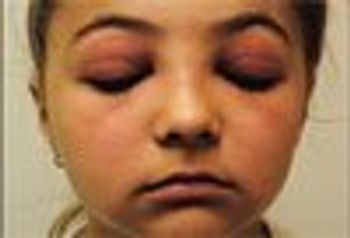
This 8-year-old girl has had swollen, red eyelids for the past 24 hours. She denies pain or pruritus. She has had no eye drainage, fever, or other systemic signs of illness. She reports some mild fatigue for the past few months but denies myalgias or decreased muscle strength.
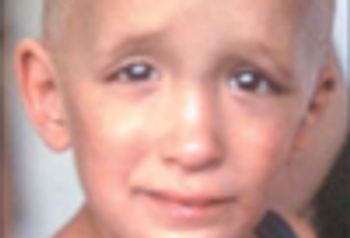
The children shown here have the same congenital condition. This disorder presents with increased birth weight, length, and head size, with subsequent rapid growth
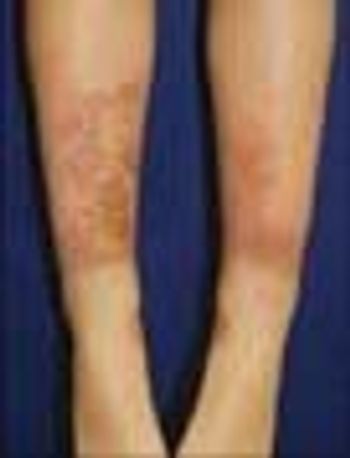
A 10-year-old boy had increasing irritation and itching of the lower legs for the past 5 weeks. The boy was an avid soccer player. Examination revealed an acutely inflamed, exudative dermatitis on the anterior aspect of both legs.
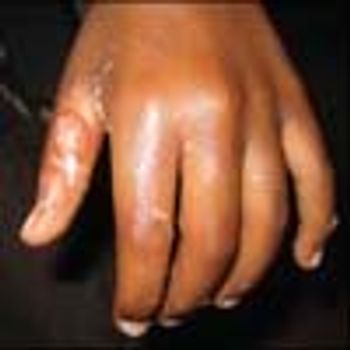
For 3 days, a 10-year-old boy had an itchy, tense, vesicular rash on the fingers of both hands (A). He was otherwise healthy.
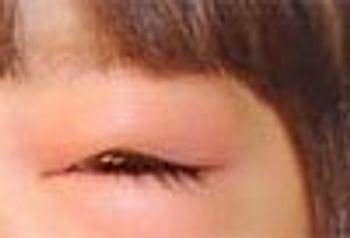
This 14-month-old girl was brought for evaluation of marked swelling and erythema of the left eyelids (A) The mother had noticed a green discharge and mild swelling of the eye 2 nights earlier.

An 11-day-old African American boy was brought in for a well-baby visit. Pregnancy, labor, and delivery had been uncomplicated.

I read with interest Drs Kumar, Noronha, and Leung's recent "What's Your Diagnosis?" case highlighting the common skin problem, keratosis pilaris. In my suburban pediatric practice, patients frequently ask me how to eradicate this benign but annoying condition.
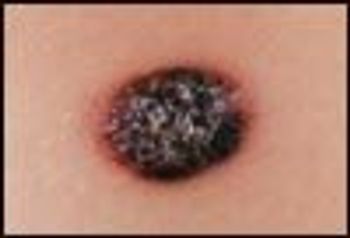
This pigmented lesion has developed over the past 12 months on the posterior aspect of a 3-year-old boy's thigh. The lesion measures 5 mm and exhibits a dark black nodular center with a light brown pigmented periphery. The lesion is asymptomatic, and the child is well.

Identification of this disorder can be difficult because of the wide range of effects of prenatal alcohol exposure. Here: tips on how to recognize its clinical manifestations and neurodevelopmental features and behaviors.

A baby boy, aged 14 days, presented with a temperature of 38.2°C (100.8°F), a generalized maculopapular rash, and purulent otorrhea. He was treated with oral amoxicillin for 10 days. At age 25 days, he again presented-this time with erythema and edema of the umbilicus, thrush, and fever of 24 hours’ duration.

A discussion of three types of Genital Lesions: Sebaceous Gland Hyperplasia of the Penis, Varicocele, and Penile Dog Bite.

Use baby's trust of mom, dad, or other primary caregiver to your advantage.

Halloween is a great time to dress up and encourage office staff to do the same.
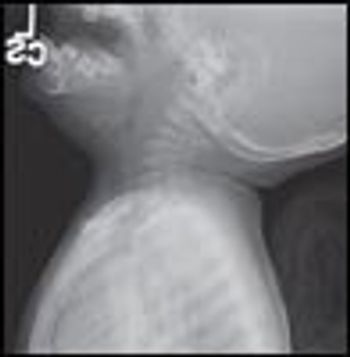
Ill-appearing 4-year-old girl with high-grade fever, without chills or rigors, and cough of 3 days’ duration. She also had a sore throat and was unable to move her neck because of pain. No history of rhinorrhea, difficulty in breathing, vomiting, or diarrhea. She had had tonsillitis 2 weeks earlier that was treated with a 1-week course of amoxicillin. Medical history otherwise unremarkable. Immunizations up-to-date.

I've just committed my family to a 5-day July vacation to Orlando so we can visit a new amusement park dedicated to Harry Potter. The famous series of books about the teenage wizard has really sparked the love of reading in many children, including mine.